Intel is investing heavily in digital technology for the Tokyo Summer Olympics in 2020, and it will host and broadcast Street Fighter V and Rocket League esports tournaments ahead of the athletic competition.
The Intel World Open tournaments will have a $500,000 prize pool and take place in Tokyo ahead of the Olympics next summer. The broadcast is intended to showcase the excitement and influence of esports. The move is an interesting one by Intel, which is both a sponsor of the Olympics and a big proponent of esports. But the International Olympic Committee voted to not include esports in the Olympics, and past members have said that violent games had no place at the sporting event.
That latter comment raised a lot of concerns, as many games aren’t violent, and the Olympics has violent sports such as boxing and wrestling. Intel’s move will certainly raise some conversation. But it could also stir up more interest among millennials for the digital broadcasts at the Olympics, which will garner global attention for weeks during the summer.
“Intel has been dedicated investing in esports for well over a decade,” said Mark Chang, the head of Intel gaming, in a press briefing. “You may not know that we’re so committed to to the space because first we’re technologists, and more importantly, we are gamers, and esports actually allows us to showcase core Intel values.”
June 5th: The AI Audit in NYC
Join us next week in NYC to engage with top executive leaders, delving into strategies for auditing AI models to ensure fairness, optimal performance, and ethical compliance across diverse organizations. Secure your attendance for this exclusive invite-only event.
Intel started this in 2018 with its collaboration with the 2018 Winter Olympic Games in PyeongChang, South Korea. And now it wants to raise the bar for how technology will be infused in the Olympics. The core pillars that Intel wants to deliver are Compute, Connect, and Experience, said Rick Echevarria, vice president of sales and marketing and group general manager of the Intel Olympics program, in a press briefing.
He said the digital broadcast will have 76 live feeds, 9,500 hours of coverage, and something like 10000 short-form clips. Intel loves that, of course, as it is a huge fountain of data for its processors to work on.
“We intend to enhance the experience not only for the viewers, our games, but also the attendees and the participants,” said Echevarria. “And that’s what you’re going to see across the portfolio of technology that we’re going to talk about. It’s also important to note that this is going to be the first in a series of announcements that we will be making around 2020.”
Compute
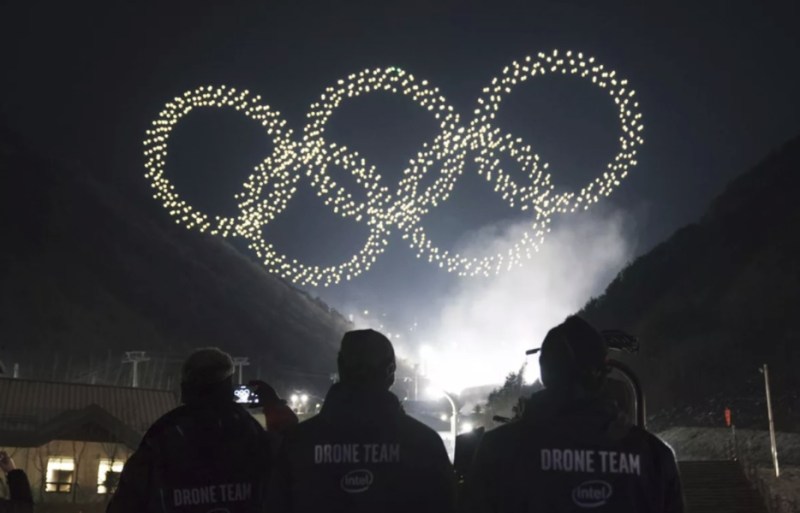
Above: Intel’s drones were one of the highlights of the opening ceremony of the Peongchang Winter Olympics.
He said that Intel will create innovations that draw on 5G platforms, artificial intelligence, immersive media, and esports. One of the technologies that will likely prove controversial is face recognition. In the name of security, Intel processors and NEC’s systems will power the NeoFace face recognition technology that will be used to identify the 300,000-plus people at the games. That includes athletes, volunteers, media, and other staff at the various points of entry for venues and accommodations like the Olympic Village.
“We, along with the International Olympic Committee Chair, have a deep belief in the limitless potential of humans, and so we’re going to, as part of our collaboration with the Olympics, continue to pursue advances in technologies that help people and help organizations achieve their greatest potential.”
Echevarria said that the technology could prevent identity fraud and reducing long wait times for ID checks. But it’s not clear if there will be an opt-out system for people who don’t want their faces logged for security purposes.
Intel will also use 3D Athlete Tracking (3DAT), a first-of-its-kind computer vision solution using AI to enhance the viewing experience for Olympic fans with near real-time insights and overlay visualizations during athletic events. Developed by Intel and hosted on Intel-based data centers in Alibaba’s cloud infrastructure, 3DAT, in partnership with Olympic Broadcast Services (OBS), uses four pan-tilt mounted, highly mobile cameras to capture the form and motion of athletes, then apply pose estimation algorithms, optimized for Intel Xeon processors, to analyze the biomechanics of athletes’ movement.
The system transforms that data into broadcast overlay visualizations available during replays of the 100-meter dash and other sprinting events.
Intel will also use virtual reality for training. The IOC and Intel are collaborating to define and implement solutions which combine the experience of the IOC and the technical expertise of Intel to support the organizing committee becoming operationally ready. VR training will be utilized to create an immersive learning experience for key managers at competition venues.
Intel’s VR training system improves training effectiveness with a more realistic experience for those learning with more accurate/objective feedback. VR can lower costs and increase training efficiency. The training will also include building digital versions sometimes known as “digital twinning” that can open several opportunities to unleash the power of data for training, planning, and simulation.
“After a very successful PyeongChang 2018, we’re excited to partner with Intel once again to bring the next era of technology to Olympic Games Tokyo 2020,” said Timo Lumme, managing director of the IOC Television and Marketing Services, in a statement. “Our extended collaboration with Intel allows us to provide the best experiences and technology to all Olympic fans who attend our events and those viewing in from around the world.”
Connect
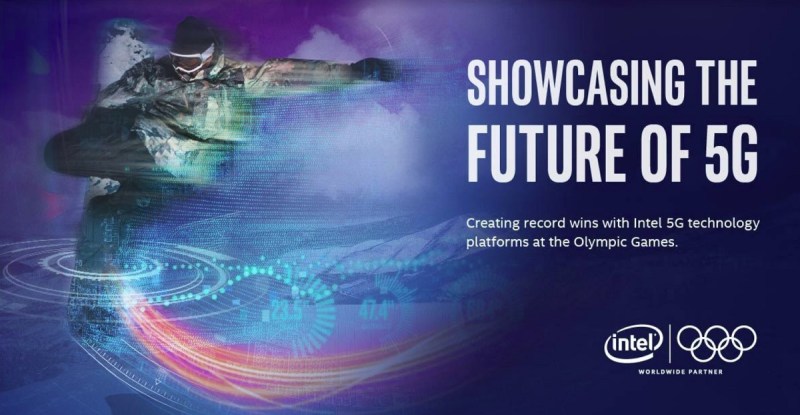
Above: Intel showcased 5G tech at the South Korea Winter Olympics in February 2018.
Intel and its partners will also bring 5G technologies for faster internet connectivity. It is working on infrastructure platforms that are paving the way to develop gigabit connectivity, new mobility solutions, more immersive viewership experiences, cutting-edge smart city applications, and advanced broadcasting services.
With Cisco, Intel is working on Trusted Network Technology, with the hope of creating a secure, reliable and flexible network to support the Olympic Games operations in executing mission-critical networks on the largest stages in the world connecting 42 competition venues including the Olympics Stadium and non-competition venues such as the athletes’ village, TOCOG headquarters, broadcasting set-ups, hotels and many more.
“Our first experience with the Olympic Games happen in the Winter 2018 games,” Echevarria said. “And it proved very rewarding for the company. And we have been deepening our relationships with this ecosystem as we go along. And that collaboration group, in particular, the International Olympic Committee, and in the case of Tokyo office, the Tokyo Organizing Committee.”
Experience
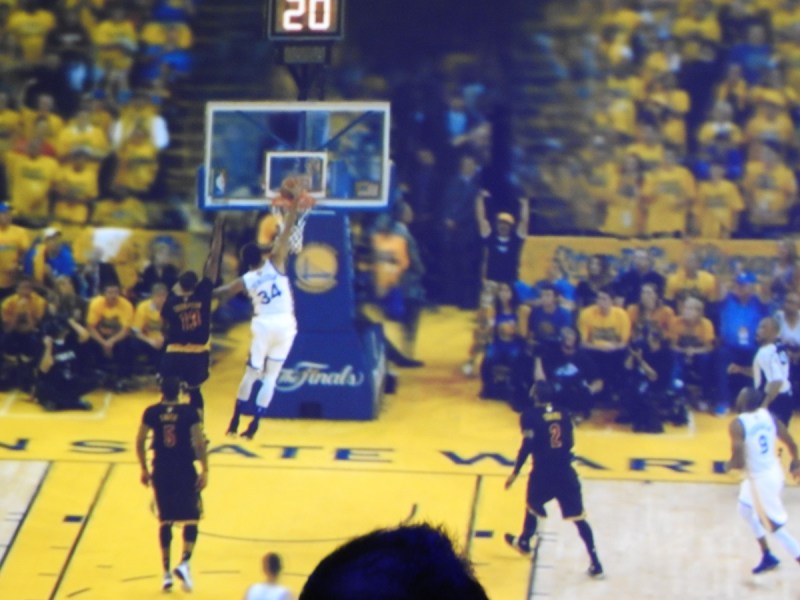
Above: Intel is opening its own TXL Labs production studio for merged reality experiences.
Together with partners, Intel is creating Olympic experiences that are more immersive than ever before, including facial recognition, and even using Intel AI solutions with the Tokyo Organizing Committee to create the theme song for Tokyo 2020, and an esports event leading up to the Olympic Games Tokyo 2020.
Intel True VR will come back after its first use at the Olympic Winter Games PyeongChang 2018, which held the first-ever live VR broadcast of the Olympic Games. This time, Intel said fans can expect an even better immersive experience at the Tokyo 2020 Olympic Games, allowing them to deeply engage in the sports they love to see once every four years.
“For Tokyo, fans can expect that even better and more immersive experience,” Echevarria said. “It will allow them to deeply engage in the sports that they really love.”
Intel True VR will be deployed in a range of sports and venues for the Tokyo 2020 Olympic Games and content will be distributed by rights holding broadcasters, including the Opening and Closing Ceremonies, track & field, gymnastics, boxing, and beach volleyball.
And Intel used AI to create the official Tokyo 2020 “beat,” or musical sounds created from a range of 1,000 different sound samples reflecting the themes of “sports”, “Japanese culture”, “daily lives” and “nature.”
This cheerful beat is formed by two parts: call (base rhythm) and response (response rhythm). Audiences will hear the call part and follow the response part to clap their hands. Working with Tokyo Organizing Committee, venues including live theater sites will support athletes to maximize their performance by creating excitement with #2020Beat.
“We’re excited to be partnering with Intel to make Tokyo 2020 the most innovative Olympics in history,” said Mr. Masaaki Komiya, Vice Director General of the Tokyo Organizing Committee of the Olympic Games (TOCOG), in a statement. “Working together with Olympic partners like Intel will be how the Olympic Games is ushered into the new age of technology and innovation.”
Esports
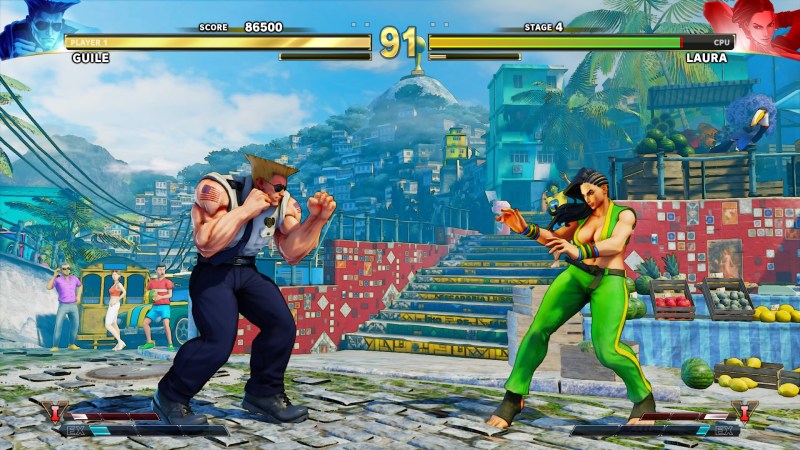
Above: Street Fighter V
The Intel World Open esports tournaments will take place ahead of the games. ESL will help Intel pull off the tournaments.
Regarding the violence of Street Fighter V, Intel said it discussed the game with the IOC. Intel chose the game because fighting games are one of the most accessible forms of esports, and the 32-year-old Street Fighter series is the best-known game in the genre. Intel also noted the research collected by the Entertainment Software Association that says violent games don’t cause real world violence. The ESA also has research on the benefits of playing games in general. Intel realizes the IOC did not make esports a “medaling sport,” but Intel still wants to highlight them.
“And what we really value is this is fostering a sense of inclusion for gamers all across the globe,” Chang said. “We also value this taking so that we get to try new things, and really push for the biggest and the best.”
Building on what Intel did with the Intel Extreme Masters PyeongChang, the Intel World Open will feature Capcom’s Street Fighter V and Psyonix’s Rocket League. It will kick off with online qualifiers in early 2020 where any player, at any level can compete for a chance to join their national team.
A live qualifier event in Katowice, Poland in June will determine which teams will advance to the championship esports tournament in Tokyo from July 22 to July 24, 2020, leading into the Tokyo 2020 Olympic Games. The live finals in Tokyo will host fans at the Zepp DiverCity venue. Intel will power all of the live Intel World Open events with the Intel Core i7 gaming processor, as well as the PCs used in the broadcasts and complete backend infrastructure.
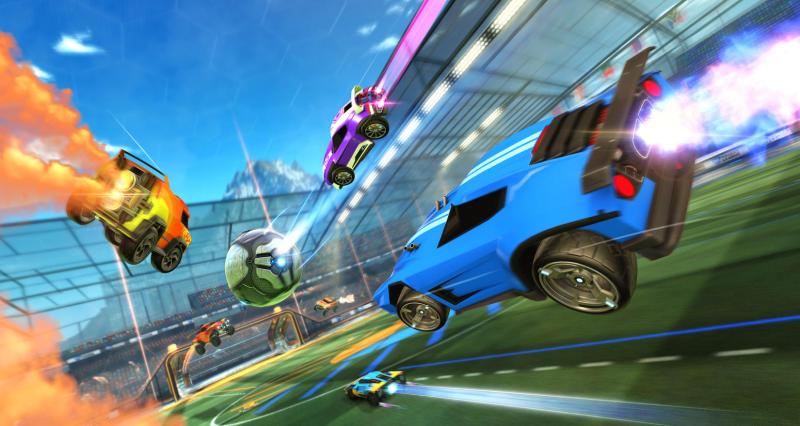
Above: Rocket League in action.
The total prize pool for both esport events is $500,000, split equally between the two games.
For Street Fighter V, 12 countries will be pre-selected to form national teams. The national qualifiers will begin March and determine each country’s four best players who will come together and form the national team of that country. The national qualifiers will last four to eight weeks, and there will be no limit on the number of participants. Once the final national teams form, they advance to Poland in June for the semi-finals.
Players outside of the 12 pre-selected national team countries can participate through the regional qualifier process that will take place between March and May. Eight teams will advance to the semi-finals in Poland through the regional qualifier process. The final qualifier will be held in June in Katowice, Poland and feature four days of team events. 20 teams will compete in a group stage qualifier to determine the strongest team from the Americas, EEMEA and APEC regions.
The final seven teams will join the Japanese team in the finals in Japan.
For Rocket League, beginning early 2020, qualifiers will be held to determine the 16 best teams from the most competitive countries in the world.
“Rocket League is very, very accessible. It’s easy to pick up, it’s easy to play, and it’s very easy to watch,” Chang said. “Essentially, it’s playing soccer with dune buggies. And it has great universal appeal.”
Multiple national teams will compete across many weeks to outplay their compatriots to earn the honor of representing their country, while also earning a guaranteed spot in the Live Qualifiers located in Katowice, Poland. A live qualifier will be held in June 2020 in Katowice, Poland. The final event in Tokyo will also take place July 22 to July 24 at the Zepp DiverCity Tokyo.
” Anybody who wants a chance to be esports champion is welcome,” Chang said. “And there is no better host country in Japan. Japan has one of the richest histories in gaming of any country. And we’re honored to be part of that.”

